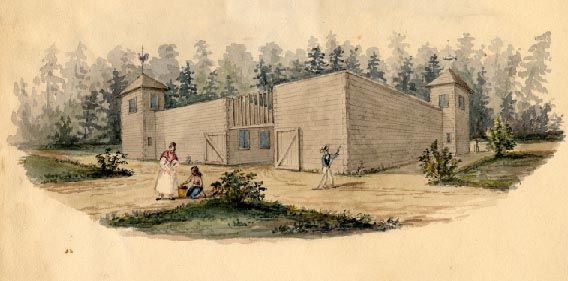

|
Instead of bringing wealth to John Augustus Sutter, the discovery of gold dealt the final blow to his precariously erected empire. John Sutter was born in Switzerland in 1803. Before age thirty he had been married, fathered a family, and built up such a tremendous list of business debts that he had to flee to the United States to escape debtors prison. He eventually arrived in California, via Oregon, Alaska and Hawaii, with a retinue of followers - including Hawaiians, American Indians and a couple of mistresses. At the confluence of the Sacramento and American Rivers, he cleared a site and built a town called New Helvetia (New Switzerland). On 1841 the Russians sold Fort Ross to Sutter on credit, further expanding his empire. Although it was a shaky structure at best, he managed to hold it together by mortgaging his property and forging an occasional check - but mostly by his great personal charm. After gold was discovered, it became impossible to maintain the empire. All his workers deserted to seek gold; the Russians foreclosed on the $30,000 debt; the courts refused to honor his claim to the gold-rich land around Coloma, where his saw mill stood, squatters even carved up New Helvetia, and he was powerless to drive them out. For a while he was able to slow the rush to ruin by renting the fort buildings to merchants. News of Sutter's financial bind reached Europe, and one of his sons came to see if he could bring order. Sutter left his son to face the indignant creditors and, taking what money he had, went on a wild spree. When he had returned, the son had salvaged part of the funds; but Sutter again took control of the estate and, after one brief period of prosperity, left for another spree. His affairs never where put in order again. Sutter spent his last years on a farm in Lititz, Pennsylvania, where he died almost penniless on June 18, 1880. If Sutter was a victim of his own extravagances, then Marshall was a victim of circumstances. James Wilson Marshall was born in New Jersey in 1810. As a young man he moved to Missouri, where he worked as a farmer and carpenter, but ill health forced him to move to a better climate. He chose California. In 1847 Marshall entered into a partnership with Sutter to build a sawmill at Coloma. One day, while inspecting the millrace, Marshall discovered flakes of gold. Although he and Sutter tried to keep the discovery secret, word leaked aout - an dhe miners poured in. For a time they tried to claim ownership of the area around Coloma, and Marshall attempted to charge a commission for the gold mined there. Most miners just laughed at his efforts and, when he persisted, drove him off the land. Some time later Marshall started to claim supernatural powers which enabled him to find gold. His claims attracted miners who pressured him to divulge his secrets; when he refused, they threatened to lynch him, and he had to flee for his life. Marshall then tried to prospect in the area, but his face was so well known that he gathered followers wherever he went. As he had to make a living somehow, Marshall returned to Coloma and began to grow a vineyard; later he helped develop some mines around Kentucky Flat. Marshall died in 1885 at age 74. Although he was not penniless when he died, fate did not allow him the wealth he discovered for others. |